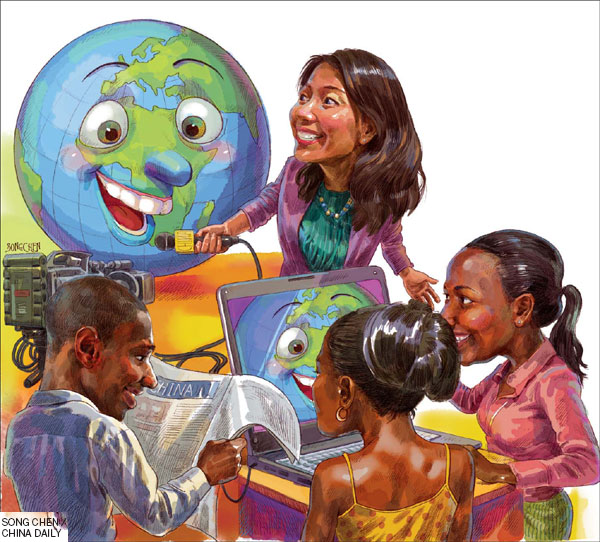Ground reality


Chinese media outlets are changing the way the world sees Africa
Much has been talked about China's increasing importance and growing influence in Africa. Though most of the discussions have centered on bilateral trade and investment, they have broadened to include China's "soft power" engagements, especially its growing media footprint.
That footprint includes direct presence through newspapers, magazines, satellite television and radio stations, and also through scholarships, training programs and academic institutes. Though experts often cite the growing number of Chinese media ventures and outlets, and the jobs created, to highlight success, the real benefits for Africa often transcend well beyond that.
The biased and distorted reporting of Western media organizations has been a big challenge for Africa, experts say, claiming that it often leads to preconceived notions and ignorance of actual developments.
Noted Kenyan author Binyavanga Wainaina says that Africa has suffered a lot due to Western misconceptions. "What we see and hear about is not the current Africa, but an Africa created and invented by outsiders' imagination and old knowledge."
Wainaina discusses these biases at length in his popular book, How to Write About Africa, which details the major impressions about Africa in different writing and research works during the last century.
"Always use the word 'Africa' or 'Darkness' or 'Safari' in your title. Subtitles may include the words 'Zanzibar', 'Masai', 'Zulu', 'Zambezi', 'Congo', 'Nile', 'Big', 'Sky', 'Shadow', 'Drum', 'Sun' or 'Bygone'. Also useful are words such as 'Guerrillas', 'Timeless', 'Primordial' and 'Tribal'. Note that 'People' means Africans who are not black, while 'The People' means black Africans."
These are some of the interesting perceptions that Western nations had about Africa, he says.
Though much water has flown under the bridge since then, biases about Africa still exist in the Western media, experts say. Chinese media outlets on the other hand are unbiased and take a more clear, balanced, often pragmatic view of the developments in Africa, they say.
Joseph Daniel Olewe Owiti, director of information in the ministry of information, communication and technology of Kenya, says that with economic growth gaining momentum in Africa, it is important to back it up with accurate, unbiased information about the continent.
"What most people do not realize is that media has great potential as a communication tool, a unifying agent across nationalities, as a catalyst for development and as a parameter for assessing national development," he says.
Welcoming the Chinese media initiatives in Africa, Owiti says that both Africa and China have suffered due to the negative reports by international media in the past. "Apart from the distorted global perception about Africa, it also led to ignorance about the opportunities and development that we have achieved."
Big strides
Even as opinion differs on China's growing media presence in Africa, experts agree that it has played an important role in presenting the continent to the outside world. That to some extent also explains the growing number of offices that Chinese media organizations are setting up in Africa.
Xinhua News Agency, China Radio International, China Central Television, China Daily, China News Service, and Beijing Review all have permanent offices and branches in Africa. Many others are in the process of setting up offices.
In 1986, Xinhua became the first Chinese media outlet to establish a presence in Africa. Chinese broadcaster CRI had a much earlier connection with the continent through its radio programs in Hausa and Swahili languages from the late 1950s.
Over the past decade, Chinese companies have also invested in building communications infrastructure, providing technical upgrades for state broadcasters and training African journalists to further strengthen media cooperation between China and Africa.
Zhang Yanqiu, director of the Africa Communication Research Center at the Communication University of China, says that Chinese media outlets have helped promote cultural ties, media cooperation and people-to-people exchanges. "They have also played a key role in promoting South-South cooperation and furthering Sino-African relations," she says, adding that the biggest benefit has been in helping create Africa's own voice and opinion.
The rapid economic growth being seen in many African countries is an important trigger for media ventures springing up across the continent, she says.
"The US (CNN, CNBC, VOA and several pay TV channels), the UK (BBC), France (France24 and TV5 Monde Afrique, CFI, RFI, Canal+, AFP), Canada, Germany (Deutsche Welle TV and Radio) and Russia (Russia Today) are all present in Africa and competing for viewers with established players such as Al-Jazeera and new entrants like CCTV," she says.
Though the mass media in Africa has diversified in recent years with the development of satellite broadcasting and new media, not much has been done to localize the content and format, she says.
"The ongoing technological, cultural and economic globalization exerts tremendous pressure on the media in Africa. Therefore, there is now more pressure on African countries to create media relevant to their interests."
Iginio Gagliardone, a research fellow at the University of Oxford, says that past research has shown that Western powers have often used media outlets to champion their causes in Africa. China's media presence, on the other hand, is still in the early stages and relatively free of any influences, he says.
Gagliardone says that much of the debate over China's media presence in Africa had been affected by the prejudices and assumptions about China's intentions rather than "concentrating on how China is either helping or hindering African countries to achieve their social and development goals".
He says that Chinese media outlets have provided a new platform and perspective on global affairs to African people.
"CCTV Africa's Nairobi expansion in 2012 and the launch of the weekly edition of China Daily for Africa in late 2012 represent significant milestones in China-Africa media relations," he says.
He says the publication of China Daily in Africa, coupled with the rising demand for high-quality English newspapers in Africa, offers an opportunity not only for Africans to have access to additional sources of information and new perspectives, but also for papers such as China Daily to experiment in new forms of journalism to attract audiences on the continent.
Today's Top News
- Dutch govt urged to mend chip dispute
- Macao's heritage sites hold special appeal for games
- China tackles N2O emissions, leading change
- AI should build a future where technology serves people
- Japan bears blame for worsening China ties
- People-centered outlook applauded






























